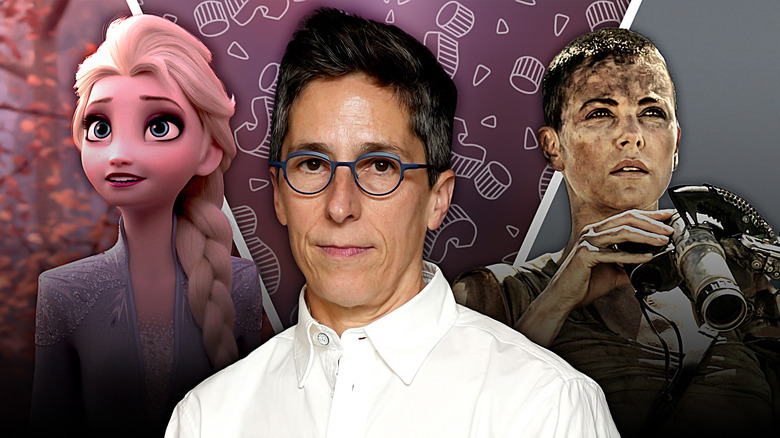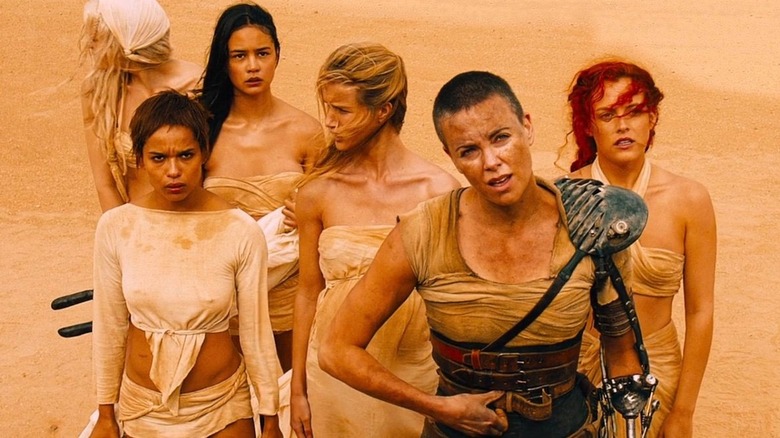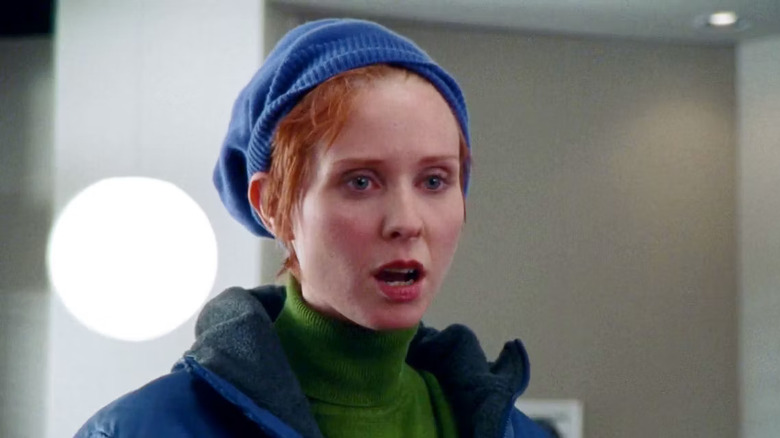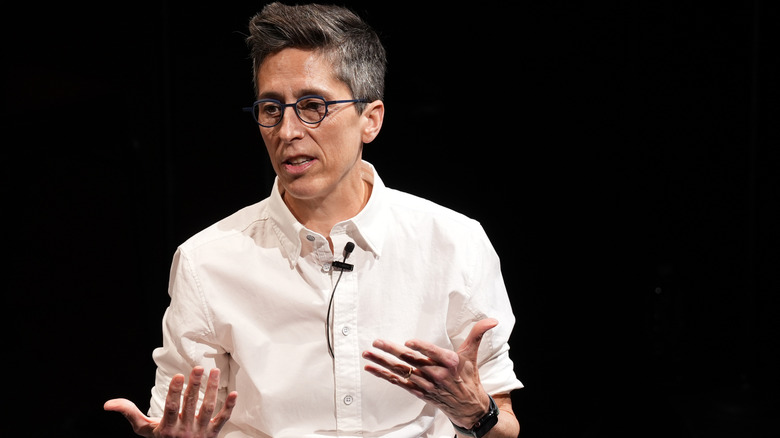What Is The Bechdel Test & Does It Really Expose A Huge Hollywood Failure?
If you ever talk about movies with like-minded friends — and it's safe to assume you do if you're reading this, to be frank — you probably have some passing familiarity with the Bechdel test. Named for cartoonist Alison Bechdel and first used in her comic strip "Dykes to Watch Out For" in 1985, the Bechdel test is a litmus test that can be used for any film (or really, any creative property) with three rules, which are as follows: the movie must have two female characters in it, the characters in question have to talk to one another, and they have to discuss something other than men. (Though it's not in the original comic, a common variation seen of the test also requires that the female characters have names and aren't just "Girl #1" and "Girl #2," and another stipulates that the conversation should be longer than one minute.) It's so well-known that, in 2018, the term was added to the Oxford English Dictionary.
On the surface, this seems like a pretty fair standard for entertainment to meet — and on some level, it is. Female characters don't always get treated with respect — unfortunately, many of the older "James Bond" films are a prime example of that fact — and they should be well-rounded enough to talk about something that isn't boyfriends or husbands. Still, throughout the years, the Bechdel test has come under fire for not being a perfect barometer for a film to earn its feminist credentials. So what does Bechdel herself have to say about its enduring popularity? And what can the use of the Bechdel test tell us about the state of the film industry today?
The Bechdel test has been applied to thousands of films — so what does it say about the film industry?
So what are a handful of films that do — and don't — pass the Bechdel test? Movies that do include "Frozen" — because sisters Anna (Kristen Bell) and Elsa (Idina Menzel) talk extensively about their own relationship and their kingdom — and "Mad Max: Fury Road," thanks to Furiosa's (Charlize Theron) stewardship of five escaped wives of the film's antagonist Immortan Joe (Hugh Keays-Byrne). Both installments of Quentin Tarantino's "Kill Bill" pass, because the many women in those films mostly just talk about murder and revenge. "Hidden Figures," which tells the real-life story of Black female mathematicians at NASA, also passes handily.
The movies that don't — which include all three of Peter Jackson's "Lord of the Rings" films, 2012's "The Avengers," "Breakfast at Tiffany's," "Gravity," and "Arrival" are just a few of them — aren't totally surprising, but still, it's a little bit of an unfair metric as far as a few of those are concerned. In the last three films, the protagonists are women, but there aren't a ton of other women in the movie for them to talk to, and "Lord of the Rings" and "The Avengers" feature powerful female characters who don't interact. Suffice to say, a movie failing the Bechdel test doesn't automatically mean it's "not feminist."
The idea behind the test, though, points to very real inequities in Hollywood. In the spring of 2024, Oscar winner Olivia Colman pointed out that the pay gap between men and women is still alive and well. Only three women in the history of the Oscars have ever won Best Director. The list goes on, frankly. Still, is the Bechdel test the best way to measure if a movie is progressive and inclusive?
There are plenty of valid criticisms and limitations of the Bechdel Test
Still, as was just pointed out, the Bechdel test is far from perfect. It could stand to be more inclusive, for one; it says nothing about depictions of queer people or people of color, though other tests, like Vito Russo test and the DuVernay test, have covered those groups. In many cases, though, a creative property led by female characters can fail the Bechdel test, and movies and shows with questionable approaches towards feminism can pass ("Twilight," a movie about a teenager who makes her boyfriend into her entire personality, somehow passes the test).
In 2022, writer Hanna Rosin came under fire when she tried to apply the Bechdel test to "Fire Island," a movie made by queer men with queer leads that focuses pretty exclusively on their relationships, somewhat proving that the test can be used in bad faith (though, it's worth noting, she did apologize).
Even shows that star multiple women don't always pass the Bechdel test, despite the fact that the story is focused exclusively on the lived experiences of said women — and in its original run, "Sex and the City" even manages to poke fun at that fact and indirectly reference the Bechdel test. In the Season 2 premiere "Take Me Out to the Ball Game," Cynthia Nixon's Miranda Hobbes hits a limit with her friends' constant discussion of men, exclaiming, "How does it happen that four such smart women have nothing to talk about but boyfriends? It's like seventh grade with bank accounts!" Miranda was right — and whether she meant to or not, she showed the limits of the Bechdel test right then and there.
What does Alison Bechdel herself think of the Bechdel Test?
So what does Alison Bechdel herself have to say about the joke she made in a comic strip that became a major part of cinematic history? Well, according to a quote she provided to Vulture in 2015 — while at the opening of the Broadway musical "Fun Home," which is based on Bechdel's incredibly personal and emotional graphic novel about her own experience growing up as a queer woman — she finds the whole thing a bit bizarre and somewhat cool, but also stressed that it's not a "perfect" test. "I feel sort of funny about that whole thing because it wasn't like I said, 'This is the Bechdel test, and now you must follow it,'" Bechdel said at the time. "It somehow just got attached to me. I mean, I did write down the principles in a cartoon, but this younger generation of feminists and film-watchers has adopted it in this way that I think is pretty cool. It's not conclusive or definitive. It's not meant as a serious metric. You can certainly have a feminist movie where there's only one woman — or no women."
More recently, in 2023, Bechdel reiterated to The Guardian that it was nothing more than a "joke" and that she never meant for it to become this enormous: "It's hard to keep talking about it over and over, but it's kind of cool." When the outlet asked if it's "dismaying" that a lot of films still fall short of the eponymous test, Bechdel responded, "What's really dismaying now is the way so many movies cynically try to take shortcuts and feature strong female characters – but they just have a veneer of strength and they're still not fully developed characters."
Ultimately, the industry still is weighted against women — but the Bechdel Test isn't a solution
The bottom line here is that, no, the Bechdel test is not the be-all and end-all when it comes to female representation in films. In fact, it's not particularly comprehensive when push comes to shove, and it can discount movies about women, by women, or starring women by putting them into an all too narrow binary. The overarching point, however, is that movies about women and for women are still far and few between, and even recent successes might not mean we'll get more.
Take "Barbie," Greta Gerwig's enormous 2023 hit that blew everyone away at the box office and earned a handful of Oscar nominations. Rumors are now swirling that Warner Bros. are happy to make a "Barbie" sequel without Gerwig (who directed the movie and co-wrote the script with her partner Noah Baumbach) or star Margot Robbie (who also served as the executive producer), and a whole spate of toy-based films are now in the works after "Barbie" made a billion dollars. To be perfectly clear: nobody wants a sequel without Gerwig and Robbie, and nobody left "Barbie" and thought, "I want to see a lot more movies based on toys." The success of "Barbie" is entirely due to its original take on a familiar pop culture icon, its refreshingly honest script, and its approach towards femininity, inclusivity, and equality. Perhaps, limited as it is, the Bechdel test is still a binary that Hollywood executives should remember when looking at potential projects; the industry still has a long way to go, and this basic test that began its life as a joke is as good of a first step as any.




